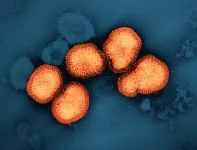(Press-News.org) Images
Highlights:
The U.S. Department of Energy Office of Science, or DOE-SC, is investing in machine learning, a type of artificial intelligence, to accelerate the speed of research and development in nuclear science. Michigan State University researchers at the Facility for Rare Isotope Beams, or FRIB, are leading five of these new grant projects.
These projects aim to enhance the breadth of FRIB’s activities, covering nuclear physics experiments and theory, as well as particle accelerator operations.
FRIB is a DOE-SC user facility, meaning that these advances will serve the global research community while preparing students to become the next generation of leaders and innovators in nuclear science.
The Facility for Rare Isotope Beams, or FRIB, at Michigan State University is home to a world-unique particle accelerator designed to push the boundaries of our understanding of nature.
Now, FRIB is accelerating that work with a form of artificial intelligence known as machine learning with support from the Office of Nuclear Physics, or NP, and the Office of High Energy Physics, or HEP, at the U.S. Department of Energy Office of Science, or DOE-SC.
“Artificial intelligence has the potential to shorten the timeline for experimental discovery in nuclear physics,” said Timothy Hallman, DOE associate director of science for Nuclear Physics. “Particle accelerator facilities and nuclear physics instrumentation face a variety of technical challenges in simulations, control, data acquisition and analysis that artificial intelligence holds promise to address.”
FRIB scientists have received several grants that aim to bring machine learning’s power to process immense data sets to bear in experiments, theoretical studies and the science and engineering that keeps the accelerator humming.
The grants will be led by Christopher Wrede, Dean Lee, Peter Ostroumov, and Yue Hao. All are professors at FRIB and in MSU’s Department of Physics and Astronomy in the College of Natural Science. Lee is the head of FRIB’s Theoretical Nuclear Science Department, and Ostroumov is the associate director of the FRIB Accelerator Systems Division.
With its grant “Machine Learning for Time Projection Chambers at FRIB,” Wrede’s team is working to shorten the time to discovery in experiments for nuclear astrophysics, helping better explain processes in stars.
For the grant supporting theoretical work, titled “STREAMLINE Collaboration: Machine Learning for Nuclear Many-Body Systems,” Lee and his colleagues are using machine learning in a variety of ways. The common goal is to accelerate the quest for a more robust understanding of the physics at work in the cores of atoms.
The third grant — “Online Autonomous Tuning of the FRIB Accelerator Using Machine Learning” — will have Ostroumov and his team leveraging massive amounts of operations data to help automate facility processes. In doing so, the team is working to minimize upkeep time and help more FRIB users conduct more science.
And Hao is leading two grants: One is titled “Development of Differentiable Beam Dynamics Simulation Tools Including Collective Effects for HEP Accelerator Applications” and the other is “Artificial Intelligence Application in Nonlinear Beam Dynamics Study for Future HEP Accelerators.”
Both will help computational studies better integrate and leverage the power of machine learning in accelerator physics. Hao’s grants were awarded by the Office of High Energy Physics, while those led by Lee, Wrede and Ostroumov were awarded by the Office of Nuclear Physics, both of which are part of DOE-SC.
FRIB is a DOE-SC user facility serving the global nuclear science research community. The work of these grants will help support that community and the DOE-SC mission to deliver transformative discoveries and scientific tools.
Beyond creating new knowledge and technology, DOE-SC and FRIB are also dedicated to training the next generation of nuclear scientists — an effort that the teams will work to strengthen with these new grants.
“AI and machine learning are hot topics,” Lee said. “They’re not just useful, they’re helping us recruit new students to the field.”
In addition to the five grants led by FRIB faculty, another award is supporting a collaboration between FRIB and Virginia State University. Led by Thomas Redpath, an assistant professor in VSU’S Department of Chemistry, the grant also enlists the services of Paul Guèye, associate professor of nuclear physics at FRIB and in MSU’s Department of Physics and Astronomy. The team’s project is titled “Neural Network Classifier for Analyzing Measurements of Fast Neutrons for Invariant Mass Spectroscopy.”
By Matt Davenport
Read on MSUToday.
###
Michigan State University has been advancing the common good with uncommon will for more than 165 years. One of the world's leading research universities, MSU pushes the boundaries of discovery to make a better, safer, healthier world for all while providing life-changing opportunities to a diverse and inclusive academic community through more than 400 programs of study in 17 degree-granting colleges.
For MSU news on the Web, go to MSUToday. Follow MSU News on Twitter at twitter.com/MSUnews.
Michigan State University (MSU) operates the Facility for Rare Isotope Beams (FRIB) as a user facility for the U.S. Department of Energy Office of Science (DOE-SC), supporting the mission of the DOE-SC Office of Nuclear Physics. User facility operation is supported by the DOE-SC Office of Nuclear Physics as one of 28 DOE-SC user facilities.
The U.S. Department of Energy Office of Science is the single largest supporter of basic research in the physical sciences in the United States and is working to address some of today’s most pressing challenges. For more information, visit energy.gov/science.
END
MSU, FRIB developing artificial intelligence tools to enhance discovery, technology and training
2023-09-15
ELSE PRESS RELEASES FROM THIS DATE:
University of Kentucky Markey Cancer Center attains NCI's highest status as a Comprehensive Cancer Center
2023-09-15
The University of Kentucky Markey Cancer Center announced today that it has earned a National Cancer Institute “Comprehensive” Cancer Center designation, the highest level of recognition awarded by the NCI. Markey is the first and only center in Kentucky to achieve this designation, and the next-closest Comprehensive Cancer Center is nearly 200 miles from Lexington. There are currently only 72 NCI-Designated Cancer Centers in the country, and 56 of those are Comprehensive Cancer Centers.
As the federal government’s principal ...
Rating platforms drive sales at tourist-area NYC eateries
2023-09-15
Ratings on platforms such as Yelp and TripAdvisor can greatly impact high-priced New York City restaurants that service tourists, but have less of an effect on restaurants frequented by “locals” outside of tourist areas, according to new Cornell research.
“In neighborhoods frequented by ‘locals,’ the advent and expansion of internet-based ratings platforms did not result in greater disparities in restaurant sales despite how ubiquitous they are and how frequently we anecdotally use them,” said Jason Greenberg, associate ...
Making AI smarter with an artificial, multisensory integrated neuron
2023-09-15
The feel of a cat’s fur can reveal some information, but seeing the feline provides critical details: is it a housecat or a lion? While the sound of fire crackling may be ambiguous, its scent confirms the burning wood. Our senses synergize to give a comprehensive understanding, particularly when individual signals are subtle. The collective sum of biological inputs can be greater than their individual contributions. Robots tend to follow more straightforward addition, but Penn State researchers have now harnessed the biological concept for application in artificial intelligence (AI) to develop ...
Scientists take next big step in understanding genetics of schizophrenia
2023-09-15
Genetically speaking, we are individuals different from each other because of slight variations in our DNA sequences – so-called genetic variants – some of which have dramatic effects we can see and comprehend, from the color of our eyes to our risk for developing schizophrenia – a debilitating psychiatric condition affecting many millions worldwide. For several years, scientists have studied the entire genomes of thousands of people – called genome-wide association studies, or GWAS – to find approximately 5,000 genetic variants associated with schizophrenia.
Now, ...
RIT collaboration with global team confirms, disproves distant galaxies
2023-09-15
Rochester Institute of Technology scientists have once again used data from the James Webb Space Telescope (JWST) as part of the Cosmic Evolution Early Release Science (CEERS) Survey to change the way we think about the universe and its distant galaxies.
Jeyhan Kartaltepe, associate professor in the School of Physics and Astronomy, and Rebecca Larson, postdoctoral research associate, co-authored a paper, “Confirmation and refutation of very luminous galaxies in the early Universe,” published in Nature confirming ...
In major breakthrough, researchers close in on preeclampsia cure
2023-09-15
Researchers from Western and Brown University have made groundbreaking progress towards identifying the root cause and potential therapy for preeclampsia.
The pregnancy complication affects up to eight per cent of pregnancies globally and is the leading cause of maternal and fetal mortality due to premature delivery, complications with the placenta and lack of oxygen.
The research, led by Drs. Kun Ping Lu and Xiao Zhen Zhou at Western, and Drs. Surendra Sharma and Sukanta Jash at Brown, has identified ...
Facebook's design makes it unable to control misinformation
2023-09-15
WASHINGTON (September 15, 2023) – As misinformation flourished online during the Covid-19 pandemic, a number of platforms announced policies and practices aimed at combating the spread of misinformation. Did those efforts work?
New research published today in Science Advances suggests that the Covid-19 vaccine misinformation policies of Facebook, the world’s largest social media platform, were not effective in combating misinformation. The study, led by researchers at the George Washington University, found that Facebook’s efforts were undermined by the core design features ...
Study shows replanting logged forests with diverse mixtures of seedlings accelerates restoration
2023-09-15
Twenty-year experiment finds that active replanting beats natural recovery for restoring logged tropical forests.
The higher the diversity of replanted tree species, the more quickly canopy area and biomass recovered.
Results emphasize the importance of preserving biodiversity in pristine forests and restoring it in recovering logged forest.
Satellite observations of one of the world’s biggest ecological experiments on the island of Borneo have revealed that replanting logged forests with diverse mixtures of seedlings can significantly accelerate their recovery. The results have been published today in the journal Science Advances.
The ...
NIH clinical trial of universal flu vaccine candidate begins
2023-09-15
Enrollment in a Phase 1 trial of a new investigational universal influenza vaccine candidate has begun at the National Institutes of Health’s Clinical Center in Bethesda, Maryland. The trial is sponsored by the National Institute of Allergy and Infectious Diseases (NIAID), part of the NIH, and will evaluate the investigational vaccine for safety and its ability to elicit an immune response.
Currently available seasonal influenza (or “flu”) vaccines are effective at preventing specific strains of influenza. Each year, the vaccines are re-evaluated and changed to best match the strains of flu predicted to be the most dominant in the upcoming flu ...
UMass Amherst neuroscientist aims to advance knowledge of human brain development by mapping the sea slug brain
2023-09-15
A University of Massachusetts Amherst neuroscientist has been awarded a $3.1 million grant from the National Institute of Neurological Disease and Stroke to advance knowledge on human brain development by using an unusual subject: the brain of the sea slug.
This tiny invertebrate is an ideal candidate to study for brain development because it adds a countable number of neurons to its brain – the number increases more than 40-fold in less than eight weeks to a total of about 10,000 neurons – while the animal grows and performs behaviors, ...



